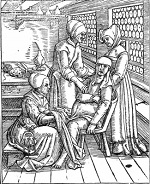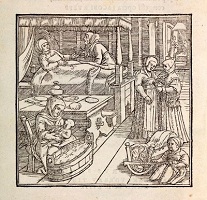Midwifery in Early Modern England
 One of the surprising facts about the study of early modern midwifery is that we cannot answer some very basic questions. For instance, historians have no idea what “made” a woman a midwife. In the modern world, we know someone is a doctor because she went to medical school, took the requisite tests, and received a license to practice medicine. But until the twentieth century, English midwifery was only very lightly regulated. Licenses to practice midwifery were issued not by a medical body, but by the Church of England (for more on that process, click here), which was concerned as much with a woman’s religious reliability and moral rectitude than her medical competence. What is more, only a small minority of women took the trouble get a license, and there is no indication that an unlicensed midwife lacked legitimacy among her neighbors. So if licensing played no role in distinguishing a midwife from her neighbors, what did?
One of the surprising facts about the study of early modern midwifery is that we cannot answer some very basic questions. For instance, historians have no idea what “made” a woman a midwife. In the modern world, we know someone is a doctor because she went to medical school, took the requisite tests, and received a license to practice medicine. But until the twentieth century, English midwifery was only very lightly regulated. Licenses to practice midwifery were issued not by a medical body, but by the Church of England (for more on that process, click here), which was concerned as much with a woman’s religious reliability and moral rectitude than her medical competence. What is more, only a small minority of women took the trouble get a license, and there is no indication that an unlicensed midwife lacked legitimacy among her neighbors. So if licensing played no role in distinguishing a midwife from her neighbors, what did?
 The short answer is that we probably will never know. In the early modern period, childbirth was a social occasion, as a woman in labor was attended not just by the midwife, but also by her friends and neighbors who assisted the midwife. And if the midwife were late or unavailable, one of these other women would deliver the child. The question then becomes, where is the line between a helpful neighbor and a midwife? While historians may never find a definitive answer to this question, there is clear evidence that early modern women knew the difference, at least in some circumstances. When we examine testimony from case involving the illegitimate birth of a child, we find that while some women described themselves as midwives, other women drew a distinction between someone who happens to deliver a child and someone who is a midwife, stating that had “acted as a midwife” or “played the part of a midwife.” I would argue that a women “became” a midwife when an expectant mother asked her to deliver her child, but in all honesty that is little more than a guess.
The short answer is that we probably will never know. In the early modern period, childbirth was a social occasion, as a woman in labor was attended not just by the midwife, but also by her friends and neighbors who assisted the midwife. And if the midwife were late or unavailable, one of these other women would deliver the child. The question then becomes, where is the line between a helpful neighbor and a midwife? While historians may never find a definitive answer to this question, there is clear evidence that early modern women knew the difference, at least in some circumstances. When we examine testimony from case involving the illegitimate birth of a child, we find that while some women described themselves as midwives, other women drew a distinction between someone who happens to deliver a child and someone who is a midwife, stating that had “acted as a midwife” or “played the part of a midwife.” I would argue that a women “became” a midwife when an expectant mother asked her to deliver her child, but in all honesty that is little more than a guess.
If we are frustrated by the difficulty of distinguishing midwives from the women who merely “acted” as midwives, things become no easier when we try to figure out how a woman became a midwife. For more on that question, read on...